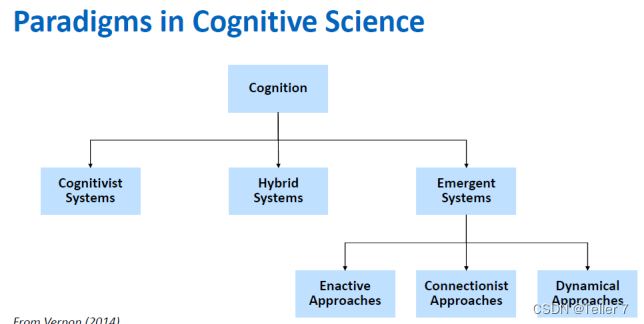1. what is cognition and what is good for?
cognition is a global process at the system level taht integrates many different processing modalities
a cognitive system is an autonomouis system that can perceive its environment, learn from experience, anticipate the outcome of events, act to pursue goals, and adapt to changing circumstances.
2.How is cognition related to intelligence and learning
special cognitive skills such as intelligence, learning, memory, interaction are constituents and synergies of a cognitive system
it provides a coherent conceptual framework that accomadates other disciplines
3.what are main components of a cognitive system
Perception -> Cognition(Anticipation->Assimilation->Adaption) -> Action
4. what are cognitive systems capable of
1.Self-Resiliance: (Goal-Directedness, Autonomy, Interaction)
perceive its environment, make sense of perceptions and predict future events
2.Perception&Action:(Interpolation, Sensing, Anticipation, Action)
able to change it self of others and within the environment
3. Adaption(Reaction, Learning, Anomaly Detection)
able to adapt to change of itself, of others and within the environment
5.is it possible to measure cognition
6. How is cognition reflected in the structure and function of the brarin
the cerebral cortexis(大脑皮层)is divided into 52 different regions based on cytoarchitecture(细胞结构) properties known as brodmann area大脑视区, individual regions correspond to specific functions.
7. What tools are avaliable to model cognitive process
Magnetic Resonance Imaging(MRI, 核磁共振成像仪)
8.Which formal tools are avaliable to model cognitive process
Diffusion Tnsor Imaging(DTI 弥散张量成像)
9.What is the difference between cognitivist and emergent systems
knowledge and representation are specific to the emerging system and depend on its history of interaction.

Connectionist cognitive systems model based on networks of simple interconnected computational units, cognitive processing in these nettwork is distributed, parrallel and based on statistical properties instead of formal rules.
Enactive emergent system developes its own understanding of the world through its interactions with the environment(phylogeny系统发生, Ontogeny个体发生)
phylogeny系统发生:由先天的物理和感知能力决定
Ontogeny个体发生:结构性的和环境耦合,利用环境
Dynamcial System based on time-dependent differential equations that allow for a compact representation of complex behaviour and the application of analysis from dynamical system theory























 241
241

 被折叠的 条评论
为什么被折叠?
被折叠的 条评论
为什么被折叠?








